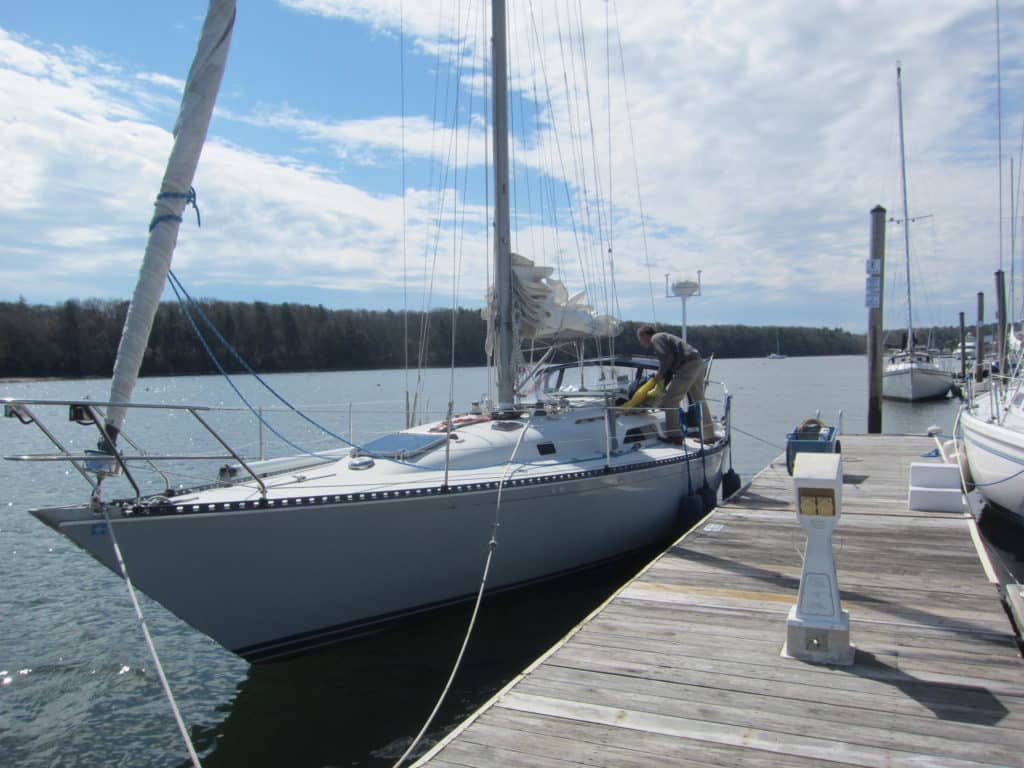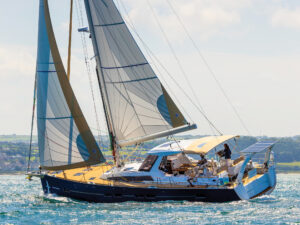
Back in the day, it was not uncommon for a crew to turn up at a sailboat regatta and sleep on the boat it was campaigning. After the racing was over, often the owner’s family would arrive and cruise home. The sport has changed, but many of the wonderful true racer/cruisers of the ’70s and ’80s remain. The boats built by C&C Yachts in Canada are some of the best of that breed.
At nearly 200 launched, the Rob Ball-designed C&C 40 was one of Cuthbertson and Cassian’s most successful models. With a beautiful spring to her sheer, rakish stem, reverse transom and rounded cabin house that gently tapers into the foredeck, the C&C 40 looks fast just sitting on her mooring. But her wolfish exterior hides a sheep. The varnished teak interior is comfortable for a boat of this size and pretty standard for those times. There’s a large V-berth forward, aft of which a hanging locker sits to starboard opposite a roomy head and shower with two doors allowing access from the saloon or forward cabin.
The saloon features a centerline table with a pair of leaves that fold out of the way for passage forward. Long settees on either side are flanked by narrow pilot berths. A small hanging locker to port is a good place to store a couple of sets of wet gear. Immediately aft is a user-friendly U-shaped galley with ample storage for food and utensils, a large icebox, and a three-burner gimbaled stove with an oven. To starboard is a large, comfortable nav station separated by a partial bulkhead from a quarter berth big enough for two — if they’re good friends. Good lighting from fixtures and three large deck hatches alleviates the cavelike feel found in many teak interiors.
In the 1970s, reliable rope clutches hadn’t yet been invented, so the more performance-oriented boats, such as the C&C 40, boasted a plethora of winches, starting with oversize primaries and secondaries on either side on the cockpit coamings for the standard 150 percent genoa and the spinnaker. Up to four more graced the aft end of the cabin house for traveler, mainsheet and other controls. Six more were clustered around the mast for the halyards, pole controls and baby stay. Most 40-footers today carry far fewer winches: maybe a pair for halyards forward, mainsheet and main halyard on the house aft and the four (if that) on the coamings for sheets.
Potential problems with the boat mostly center on the balsa core that makes the hull and deck feel so solid. This needlessly scares a lot of potential buyers. The Canadian C&Cs have a well-deserved reputation for quality, so you will rarely find any issues with the hull. However, it’s worth hiring a good surveyor to test both the hull and deck with moisture meter and hammer. Most boats will test positive in a few deck areas, which, unless extensive, shouldn’t be a deal breaker.
C&C 40s were sold in three sailing configurations: a keel centerboard version with 5-foot draft, the standard 7-foot deep keel and a tall-rig, deep-keel version that added 18 inches to the mast and 6 inches to the draft. A three-cylinder 27 hp Yanmar diesel engine was standard and pushed the boat along at a little under 6 knots in calm water. Fortunately, the 40 is such a good sailer that even in light air it’s usually faster — and always more fun — to sail.
My wife and I find Peregrine, our C&C 40, to be quick, easy to handle and a joy to steer as we expand our home waters. We forgo huge racing jibs and set a 110 percent blade jib or an asymmetric spinnaker from a sock to pull us along. And we never fail to pause at the oars and admire our beautiful boat as we row ashore.
Former CW associate editor Andrew Burton is a delivery skipper who has logged more than 350,000 offshore miles.








